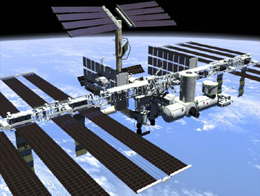Russian cosmonaut manually launches satellite into space
The unique satellite can be controlled and manipulated from Earth with a satellite telephone

Russia's Mission Control has received the first signal from the Nanosat minisatellite, which cosmonaut Salizhan Sharipov manually launched during a spacewalk. A Mission Control spokesman said that the minisatellite weighed only five kilograms, and the cosmonaut simply cast it aside with his hands, like a soccer ball. “The original acceleration of the satellite was only one meter per second,” a specialist said. 
The cosmonaut threw the satellite off against the movement of the International Space Station to exclude a possible collision of the small spacecraft with the space station.
The Russian minisatellite will stay in the orbit for about three months, until it runs out of the battery power. The satellite is outfitted with a transmitter of the international satellite system to search and rescue vessels and airplanes in distress.
”It is the first experimental spacecraft in Russia, which can be controlled with a satellite telephone of the GobalStar system,” Valeri Vishnyakov, the chief professor of the Space Instrument-Making Research Institute told RIA Novosti.
”When the unique technology is tested, it will be possible to use it with common telephone users. A subscriber will be able to establish a connection with the nanosatellite and receive various information, such as situations with traffic on roads, latest weather forecasts, and so on,” Vishnyakov said.
Minisatellites, the professor added, would be henceforth launched with the help of Kosmos-3M or Dnepr light class carrier rockets. “New satellites will have three years of work capacity. It will also be possible to launch five of such minisatellites at once. Each of them may have its special purpose, and it will therefore be a lot easier and cheaper to do in comparison with the vast amount of work connected with building one large universal spacecraft,” the specialist said.
Valeri Vishnyakov added that a more complicated, modified version of the Nanosat minisatellite was planned to be launched from a Progress carrier rocket on its way to the International Space Station. “It will be a heavier craft - 7.5 kilos. It will stay in the orbit for about three months as well,” Vishnyakov concluded.
Subscribe to Pravda.Ru Telegram channel, Facebook, RSS!


